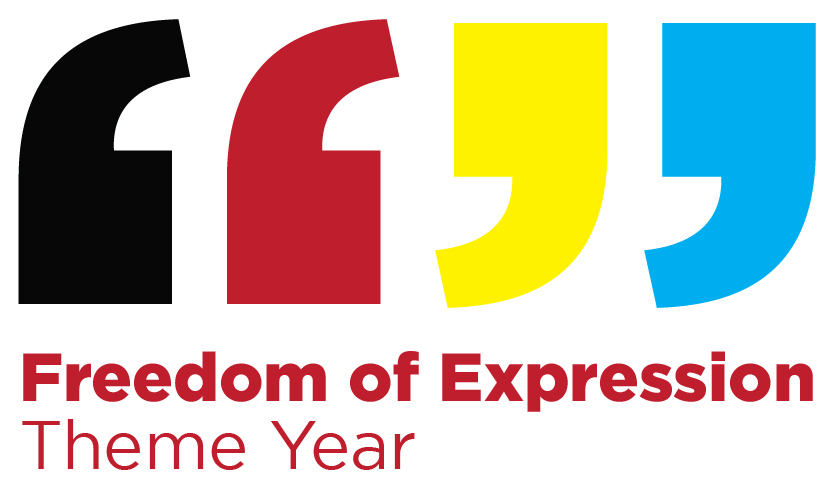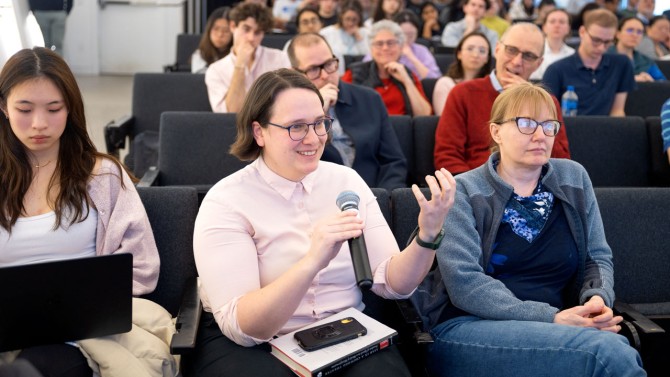
Jeff Kosseff, an associate professor of cybersecurity law in the United States Naval Academy’s Cyber Science Department, speaks as part of the Cornell Ann S. Bowers College of Computing and Information Science’s Distinguished Speaker series on free expression.
Like it or not, lies should be protected under First Amendment
By Louis DiPietro
DeAngelo Bailey picked on the wrong kid – a scrawny fourth-grader named Marshall Mathers – and Bailey found out how big a mistake it was some 20 years later.
That’s when Mathers – then better known by his stage name, Eminem – exacted revenge by embellishing Bailey’s bullying in a song on his 1999 breakout record, “The Real Slim Shady.” Bailey sued Eminem for casting him in a bad light – and lost, even though the lyrics weren’t completely true.
The Bailey vs. Mathers case is one of many examples Jeff Kosseff, associate professor of cybersecurity law in the U.S. Naval Academy’s Cyber Science Department, leans on to make his larger point: that the constitutional right to lie extends to every American – 15-time Grammy award-winning rappers or otherwise – so long as the high judicial bar for fraud, defamation or another narrow category of speech isn’t met. And it should continue to do so, even in the age of misinformation, he said.
“We always have to look at the protections we have,” said Kosseff, who presented the talk, “Why the First Amendment Protects Misinformation, and Why it Should Continue to Do So,”on March 13 in Gates Hall. The lecture was part of the Cornell Ann S. Bowers College of Computing and Information Science’s Distinguished Speaker series on free expression, held in conjunction with the university’s Freedom of Expression theme year.
“I employ a very cautious look at the First Amendment and [want to] be abundantly clear about what we might be sacrificing if we were to start rolling back First Amendment protections,” he said. There isn’t “a perfect solution to misinformation, and there never will be, regulatory or nonregulatory.”
Kavita Bala, dean of Cornell Bowers CIS, prefaced Kosseff’s talk by recognizing Cornell Bowers CIS as a community willing to grapple with questions that don’t have easy answers.
“Propaganda has existed for a long time in human history. That’s not new, but the mechanism of how social media spreads that propaganda is new and could potentially amplify the risks,” she said. “We as a community should be thinking about how to tackle it.”
Limits on free speech won’t fix the problem of misinformation, Kosseff said. Instead, they would pose a larger, more ominous threat where truth is dictated by governments instead of being formed in the “marketplace of ideas.”
Drawing on examples from his latest book, “Liar in a Crowded Theater: Freedom of Speech in a World of Misinformation,” the lawyer and former journalist argued that the First Amendment should continue protecting much of what we would call misinformation, such as lies about vaccines or stolen elections. The alternative, in which governments become “arbiters of truth,” would give politicians dangerous power to censor, he said.
Kosseff said strategies to address misinformation should play out in the “marketplace of ideas,” where “the best solution for bad speech is more good speech.” It’s a sentiment inspired by Supreme Court Justice Oliver Wendell Holmes in his 1919 defense of free speech that, Kosseff added, has been “the underpinning of United States free speech law for more than a century.”
He said we can formulate meaningful “partial” strategies to address misinformation when we consider, as former President Barack Obama said in 2022, not just the supply of toxic information but also the demand for it. The answer, Kosseff suggests, lies partly among citizens.
He pointed to Finland’s media literacy training, which was launched in 2016 to inform politicians, journalists and students in college and K-12 schools about misinformation.
“This is not a panacea,” he said, “but at least helps people understand how to better address the torrent of misinformation coming at them.”
Elsewhere, he cited the need for more sources of rigorously vetted information, and suggested government and nonprofit funding for local media, which continues to flounder across the country as ad revenues dry up. Governments, too, can combat misinformation by building trust, much like Denmark did with its transparent messaging throughout the COVID pandemic, he said.
When an audience member asked about the role of social media companies in disseminating misinformation, Kosseff said there’s been a shift over the past few years where platforms have been sued for functionality that caused harm. He pointed to lawsuits brought against Snapchat for its Speed Filter, which critics said encouraged reckless driving. Snapchat scrapped the feature in 2021.
“That’s a way that courts are starting to impose some accountability on the platforms,” he said, “by not going after the speech component but going after the design component.”
Louis DiPietro is a writer for the Cornell Ann S. Bowers College of Computing and Information Science
Media Contact
Get Cornell news delivered right to your inbox.
Subscribe


